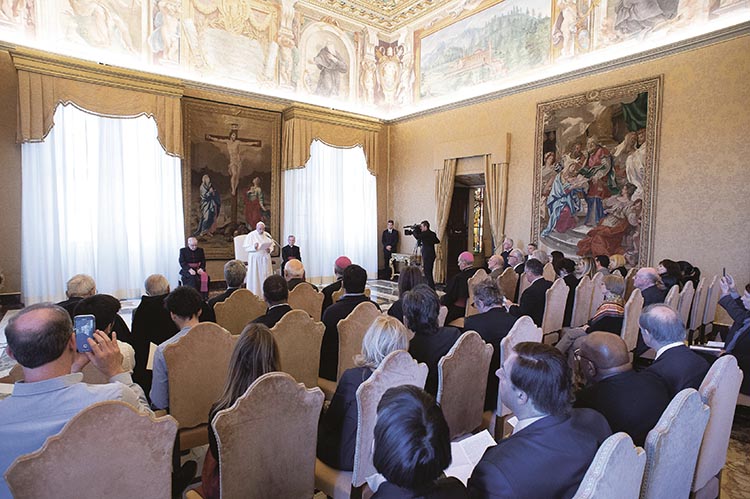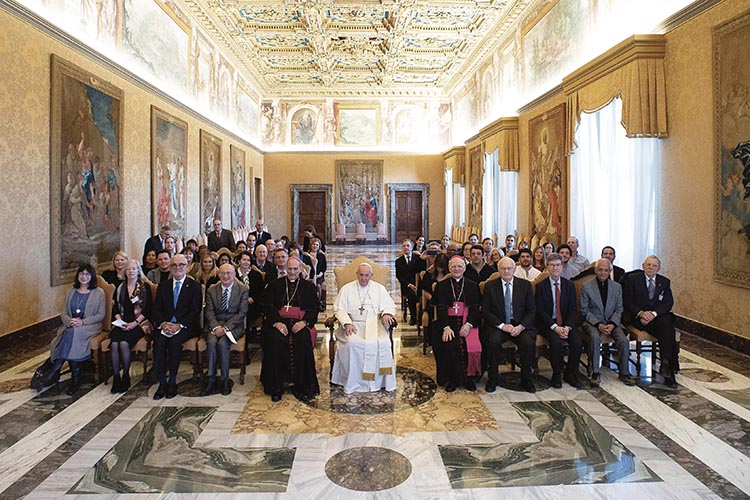With creativity and courage, promoters of a path of hope
A year and a half after the first appeal, Pope Francis has returned to relaunch the Global Education Pact, to rebuild a more welcoming, just and supportive world, starting from the foundations of the education of the new generations.
To accept the challenge presented to us by history and to sign together a global educational pact, which aims to "look beyond" the immediate situation of individual and specific social emergencies, to put the person back at the center and thus build a sustainable future for every member of the human family. In these few lines we can summarize the great future perspective, undoubtedly prophetic, which rests on the educational necessity, initiated by Pope Francis more than a year ago. On September 12, 2019, the Holy Father appealed with a. Message to all representatives of the earthWe are committed to the goal of making everyone do his or her part in an area as central to future generations as education.
In retrospect, one notices that this theme represents a vision already expressed many times throughout the pontificate, in particular in the structure of the apostolic exhortation Evangelii gaudium and in the encyclical Laudato si'which, for obvious reasons, refer to the orientations of the Council and the post-Council.
Benedict XVI...
How not to recall, in this line, also the great contribution already made by Benedict XVI in his Magisterium. In 2008, the famous Letter to the Diocese and City of Rome "on the urgent task of education", in which he listed closeness and trust arising from love as the keys to initiate an authentic education, starting from the fundamental experience in the family. Ratzinger did not skimp in saying that even if the responsibility is primarily personal, it is "a responsibility that we share together, as citizens of the same city and the same nation, as members of the human family and, if we are believers, as children of the one God and members of the Church".
Francisco...

Returning to the programmatic document of Pope Francis' pontificate, Evangelii gaudium, it is evident that the task of missionary outreach, which calls everyone to carry the proclamation of the Gospel, is evident "in all places, on all occasions, without delay, without disgust and without fear."to discover and transmit the "mystique" of living together and experiencing true fraternity. In Laudato si' the reference to education is very precise and it is necessary to create inclusive communities that know how to listen and dialogue constructively, initiating processes of exchange and transformation to guarantee future generations a future of hope and peace.
All these aspects resurfaced in a more evident way in the third encyclical of a few weeks ago, Fratelli tutti, where, drawing from the rich tradition of the Social Doctrine of the Church, the complexity of human affairs, with its dark points and its dramas, is projected with a light of hope, dreaming of a better future for all the inhabitants of the earth, children of the same Father and, therefore, brothers and sisters.
The Global Compact
The Message with which in 2019 the Pope invited to a global educational pact does not make explicit a concrete action per se, nor does it define a program, but we could say that it initiates a process, calls for a commitment, invites to an alliance. In short, he summons all people of good will who feel called to do so, even with reciprocal differences, to place their forces at the service of a common project. The Pope does speak explicitly of a Village of education, in which "The commitment to generate a network of human and open relationships is shared in diversity", after having first prepared the ground "of discrimination with the introduction of fraternity".
Still in this village -"to educate a child it takes an entire village".It will be possible to adapt education to all the components of the person: study and life, in teachers, students, families and civil society, with all the intellectual, artistic, sporting, political and entrepreneurial expressions....
The impetus launched by the Pontiff more than a year ago finally recalled in short "the courage to place the person at the center", "the courage to invest the best energies with creativity and responsibility" and "the courage to form people available to put themselves at the service of the community".
A new impetus
The idea was to bring together in Rome public personalities who, at the global level, have positions of responsibility and concern for the future of young people, to reflect together on how to initiate "processes of transformation" and find solutions that lead to "a humanism of solidarity, which responds to the hopes of man and the design of God".
This event was to take place on May 14 of this year but was postponed for reasons related to the Coronavirus pandemic.
Meanwhile, on October 15, with an event at the Pontifical Lateran University coordinated by the Congregation for Catholic Education, the idea of the Global Education Pact has been relaunched even more explicitly and urgently, also thanks to the experience of the health emergency.
The initiative included a video-message from UNESCO's Director General Audrey Azoulay, who, referring to the pandemic, underlined how it has "revealed all the existing social inequalities", a crisis that especially affects the most vulnerable and "has triggered what can be defined as the globalization of indifference, especially towards the most fragile".
It was a long awaited Pope Francis' message. This second intervention, this "relaunch" a year and a half later, could not fail to take into account Covid-19, and that the opening words of the Holy Father began right here: the health emergency "has accelerated and amplified many of the emergencies and emergencies that we had noted, and has manifested many others".
But the Pope immediately warns: health measures may help, but they must be accompanied by "a new cultural model" that cannot fail to put the dignity of the human person first.
Education, on this point, represents - and the Pope reiterates it - "one of the most effective ways of humanizing the world and history", "a natural antidote to individualistic culture".
Therefore, Francis calls it an "integral itinerary," a "shared journey" that leads to overcoming loneliness and mistrust, but also indifference to forms of violence, abuse and slavery, including exploitation of the planet.
Seven specific objectives
The call for the urgency of signing an educational pact is also dictated by the current health crisis, so the Pope's final appeal is to involve everyone in a "plural and multifaceted process" with seven concrete objectives: to put the person, his or her dignity and uniqueness at the center; to listen to the voice of children, boys and young people; to promote the full participation of girls and young women in education; to consider the family as the first and indispensable educating subject; to educate one another to welcome the marginalized and vulnerable; to reform the economy and politics in favor of the common good and integral ecology; finally, to protect the common home from the exploitation of resources, demanding more sober lifestyles and developing a true circular economy. A call to courage, to creativity, to be promoters of a path of hope.







